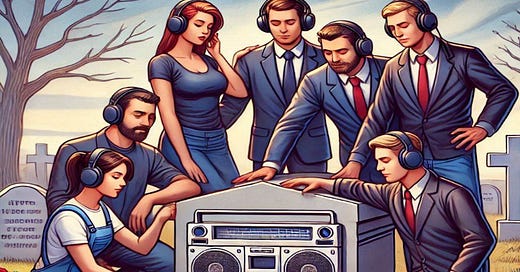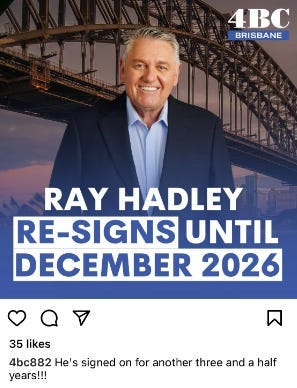Is this the end of radio?
As broadcasters struggle with declining revenues and ratings, they should also be concerned about a future that might not need what they’re doing now
I’m going to start with a statement about the future: Radio is dead, long live radio.
It’s a message in two parts, so let’s take them separately.
By “radio is dead” I mean that linear broadcast radio on the airwaves is in decline and won’t recover the large audiences that have gone, and will continue to go, elsewhere. By “long live radio”, I mean that there’s still an appetite for audio but it needs to be presented and packaged in different ways.
This is hardly a groundbreaking revelation. What is interesting to me is that this all seems much closer now than I would’ve predicted a year ago.
When overarching change happens, it generally happens slowly. But the graph of radio’s decline, which is still a work in progress, is bound to show some significant blips in 2024.
When ARN signed up Kyle Sandilands and Jackie Henderson on 10-year $100 million contracts in late 2023, it was as much a bet on broadcast radio itself as it was on that particular duo.
While I’m not going to revisit their story now (but watch this space), I will openly wonder whether radio as we know it lasts as long as their contracts.
One big sign that something is afoot is the extraordinary number of departures we’ve seen from radio stations over the past few months.
Like many observers, I was expecting the usual end-of-year departures: some genuine retirements and resignations, plus more sackings. Sadly, many regional stations no longer have anyone on site. That will be true of major markets soon enough.
But I don’t think anybody foresaw the volume of the turnover across the board in Australian radio that’s occurred since late 2024 — especially at the ABC*, where these things used to happen at a glacial place (often via generational change). You can read about that, and the fallout, here.
John Laws finally retiring from 2SM, where he had a small, unmeasured audience, was bound to happen in the wake of station owner Bill Caralis’s passing in July. But what’s deal with Ray Hadley?
In May 2023, 4BC was celebrating Hadley’s re-signing until 2026 — with an image of him in front of that famous Brisbane icon, the Sydney Harbour Bridge. Not long later, he was dropped from the Brisbane line-up altogether. And now he’s gone from his home station of 2GB, too.
His replacement, longtime stand-in host Mark Levy (who is probably doing quite well for himself but won’t be earning anywhere near as big a pay packet as his predecessor), is facing an added challenge this year: former 2GB and Sky News host Chris Smith, who has variously been described as “disgraced” and “reformed” (feel free to Google him to discover why).
Smith has already replaced Laws on a re-energised 2SM and the “Super Network” of stations in regional NSW and Queensland. Veteran broadcaster Ron Wilson was announced as 2SM Breakfast host late last year and will go to air on January 13.
I foresee a tough battle for a diminishing market sector (especially if 2SM rejoins the ratings survey, so its numbers will be counted and measured against those of 2GB and the ABC).
2GB also has had to find a new Drive show host, with Chris O’Keefe — thought by some to be the leading contender for Hadley’s job — falling on his own sword.
I think it’s a safe prediction that 2GB will never again enjoy the huge ratings numbers it saw five, 10 or 20 years ago. With the latest appointments, the Nine Radio Sydney flagship seems to be doubling down on a formula that has its strongest appeal to a certain type of older listener.
Appealing to older people is by no means a bad thing — but when you exclude those with centre or progressive political and social viewpoints, it’s a market with diminishing returns in terms of both money and influence.
In a more global sense, the big talk-radio stars are now plying their trade in the paid space — either on subscription radio (think Howard Stern in his hey-day on satellite radio) or podcasts (did somebody say Joe Rogan?)
I’m not predicting an immediate crash for talk radio on the broadcast airwaves in Australia, but I think 2024-25 will be seen as a turning point.
So, what replaces talk radio in the long run? I suppose the answer is podcasts. And it’s a far more open and level field than the closed shop of companies with broadcast licences. (I remember a time when a single FM licence was sold at auction for more than any of the major industry players could even rustle up these days.)
While the radio networks are all active in the podcast space, their competitors include News Corp’s The Australian, independents Mamma Mia and Schwarz Media, and others of various means who are carving out a niche on their own or with the help of global players such as Spotify.
Some individuals are already making a living out of podcasts from very small outlay. A laptop computer with an internet connection and a half-decent microphone will get you started. Many of these podcasts double as YouTube content, offering a decent income stream for those who strike a chord with audiences.
Everyone is after a slice of the same advertising pie.
So, is radio dying?
No doubt the commercial radio lobby will pull some figures from a hidden orifice suggesting the industry is in rude health, but they’re not even fooling themselves these days.
Networking, job cuts, real-estate sales, attempted mergers and flatlining share prices are all evidence that things are not well.
I love radio and (most) radio people. I want to write about success stories. I’m just not sure where they’ll be coming from.
Please get in touch if you can tell me about the next big thing.
*Not so much in Brisbane, to be fair. The ABC Brisbane line-up has only just one new voice, that of Ellen Fanning.





